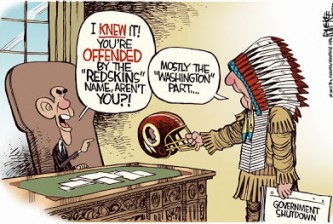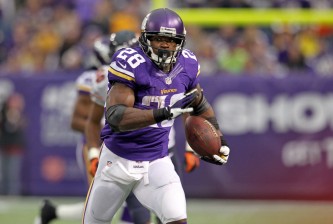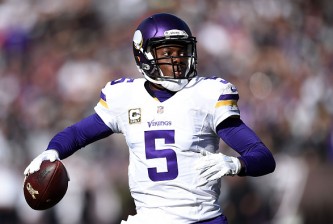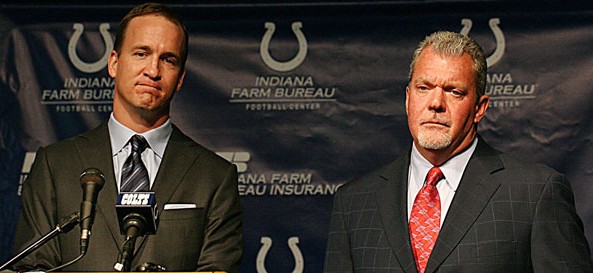The Indianapolis Colts cut Peyton Manning.
A year and a half later, those words are still surprising. While both parties have fared well since parting ways, the move is still shrouded in misinformation and controversy.
As Manning prepares to lead his Denver Broncos into Indianapolis next Sunday, now is the perfect time to revisit the fact and fiction of one of the most controversial cuts of all time.
There are eight myths surrounding the decision that have to be dispelled in order to fully understand how the man responsible for Lucas Oil Stadium came to suit up in the visitors' locker room. These commonly held beliefs are often furthered by the press, but all are erroneous.
The purpose of this piece is not to argue that the Colts should not have cut Manning. In fact, that's one of the myths about the decision. Instead, the only goal of this piece is to set the record straight so that when we discuss the historical importance of the move, we can do so with all the facts straight.
Myth #1. The Colts had no choice but to cut Manning for salary cap reasons.
Shortly after the Colts parted ways with Manning, they began a roster purge that saw classic Colts like Gary Brackett, Joe Addai and Dallas Clark cut from the team. The Colts were in salary cap hell, and that necessitated radical roster restructuring.
It has been stated several times, most often by Indianapolis Star columnist Bob Kravitz, that the Colts had no choice. They could not keep Manning and field any kind of squad in 2012.
This is patently false.
Manning was slated to have a 2012 cap hit of roughly $17 million. However, because he was cut with signing bonus money still outstanding, he still had a cap hit of $10.6 million even after he was cut.
By cutting Manning, the Colts saved $6.4 million in cap space in 2012.
Some may recall that they had an easy source to recoup the money necessary to cut Manning. Dwight Freeney was in the final year of his contract with a base salary of $14 million. Had the Colts parted ways with the defensive end, they could have kept Manning and actually had $7.6 million MORE in cap room than they did. By the way, in exchange for that $14 million the Colts got five sacks and 34 hurries.
Now, rolling that forward to 2013, Indy would have definitely had less cap room to work with. Manning would have cost $18 million against the cap. Of course, the Colts spent widely in the 2013 offseason, but the early returns haven't been great. Eric Walden has played poorly. LaRon Landry has missed extensive time. Donald Thomas is out for the season. Greg Toler has been abused at times.
The Colts would have had to be more frugal this past offseason (assuming Manning didn't restructure his deal), but they still would have had plenty of cap room to operate.
There's no question that Luck is more friendly to the Indy cap than Manning would have been. Whether Manning would be worth the extra money is a debate for another day. The simple fact remains that Indianapolis did not have to cut him.
They chose to.
Myth #2. Keeping Manning would have meant no Wayne or Mathis
The corollary to myth #1 is that Manning would have so crippled the Indy salary cap, that none of the other moves, including re-signing Robert Mathis and Reggie Wayne, could have taken place.
If point #1 is a lie, so is point #2. As noted, cutting Freeney instead of Manning would have resulted in MORE cap room for the Colts, not less.
So, yes, Wayne and Mathis could still have been retained. Additionally, every other player brought in by Ryan Grigson could have been signed. Theoretically, Indy could have fielded an identical roster in the "Manning-version" of 2012.
Myth #3 The Colts wouldn’t have cut Manning if they had won the last game.
Some writers like to play the "what-if" game about the Colts final game of the 2012 season.
If Indy had beaten the Jacksonville Jaguars, they would have wound up with the second overall pick. The thinking goes that they then would have kept Manning.
This is purely hypothetical, but according to Jim Irsay, he would have made the same call.
So as long as we are playing the counter-factual alternate universe game, we can scratch off a mad fourth-quarter rally by Dan Orlovsky as a way to preemptively cut the Gordian Knot of Luck v. Manning.
Myth #4. Manning wouldn’t have survived behind the Indy line.
Luck was hit more than any other quarterback in 2012, and some argued that the immobile Manning would have been torn to shreds behind the Indianapolis line.
That's total nonsense.
Indianapolis had terrible offensive lines in 2008-2010, yet Manning was perennially the least sacked passer in the game. The bulk of the responsibility for sacks comes not from the linemen but the quarterback himself. Manning's quick release allows him to avoid sacks throughout his career even as the quality of his linemen waxed and waned.
Sacks are about decision making and release. Both are areas in which Luck has room to grow. Manning would have played just fine behind the 2012 line and would likely have taken half the sacks Luck did.
Myth # 5. The Colts made a mistake in cutting Manning.
Skip Bayless would have you believe that cutting the soon-to-be five-time MVP was a horrible mistake.
The Indianapolis Colts gave up PEYTON MANNING for Andrew Luck? SERIOUSLY?
— Skip Bayless (@RealSkipBayless) October 15, 2013
He is wrong.
While I think a sound argument can be made that the Colts would be better right now if they had Manning than they are with Luck, that's a far cry from calling the move a mistake.
In fact, as long as the Colts chose between Manning and Luck, they couldn't possibly have made a mistake. It's like being forced to choose between the greatest cheesecake ever and a larger piece of cheesecake that is almost as good (In a related story, I may or may not be on a diet right now. A younger man would have made some kind of boob reference, but I'm definitely sticking with cheesecake).
Manning is in the middle of an amazing run of play, but there was serious risk associated with him in the spring of 2012. Luck was a sure bet, and Manning was a big risk, albeit one with a bigger upside.
Manning is better than Luck now, and is likely to be better than Luck for another couple of years. That's not a stretch to say; he's probably better than any quarterback has ever been. Saying Manning's upside is bigger is not a slight to Luck. No one in history has ever played to the level he's playing right now. Luck could become the best player in the NFL and never play as well as Manning is currently.
Anyone who has watched Luck at all knows that his ceiling is virtually unlimited, and he has a real shot at being an Aaron Rodgers-type force in the NFL. Even so, Manning is one of the five best players ever, possibly the greatest. That's a high standard to meet.
The Colts made the right move by cutting Manning. Of course, if they had kept him, it would also have been the right move.
Myth #6. Manning and Luck could have co-existed.
The only possible mistake the Colts could have made would have been trying to keep both Luck and Manning. This was evident from early on.
Luck was clearly ready to play, and asking Manning to give up practice and game snaps would have been a recipe for disaster. Neither player would have done well standing around watching the other.
Trading the rights to the top pick would have brought Indy a massive haul of picks. Be it Cleveland's whole draft or a Redskins-style offer of three first round picks, there's no question that the Colts would have had a major influx of talent thanks to the Luck pick.
Obviously, cutting Manning has worked out well for Indianapolis too.
Dealing with the cap restrictions of Manning without getting the picks for Luck would have only delayed the decision. They would have had to trade one or the other after the 2012 season, and given the way Manning played in 2012, the choice would have been Luck.
They would likely have received much less value for Luck after 2012 than before the draft. The reason is that teams would want a discount for the loss of one year of his rights.
Keeping Manning required a full commitment to Manning. That is not something the Colts were prepared to do in March 2012.
Myth #7. The Colts made a move for the next 15 years.
Perhaps the most ridiculous meme out of the decision to take Luck was that the Colts were choosing 15 years of winning.
While that may happen, it's important to realize that the NFL isn't baseball or basketball. The future is always now. You can rebuild and reshape teams in a single season, two at the most. Look at the Steelers and Giants. Even with multiple rings from their future Hall of Fame quarterbacks, 10 years in and both franchise have to at least be thinking about moving on.
The choice was not two or three years of Manning versus 15 of Luck.
The choice was five years of Manning versus a decade of Luck. Manning is a football junkie who after surviving surgery to come back isn't going to walk away any time soon. He'll be with the Broncos long enough to break all of Favre's passing records, and at the pace he's playing now, Denver can count on a couple more MVP-level seasons for their trouble.
Only 22 players in history have started 160 games at quarterback in their career. Only about 12 or 13 did it with a single franchise. Move that bar to 180 games and the list drops to five.
The odds are very much against Luck playing 15 years for the Colts. Ten is a more realistic number.
The Colts gave up five years of Manning for around 10 years of Luck.
Myth #8. There was ever any decision at all.
Go back and rewatch the press conferences for Ryan Grigson and Chuck Pagano. Grigson wouldn't even say Manning's name.
There was no hemming and hawing internally. The Colts didn't believe Manning was healthy. They were dead set on selecting Luck. Irsay had conflicted emotions, but it was evident for two months what he was going to do.
Jim Irsay made his choice early in the process, and the awkward final two months was merely the fall out. He believed Manning wasn't healthy, and he did what he thought he had to do.
Talking to Colts staff at training camp 2012, everyone spoke in hushed, worried tones about Manning's health. People were genuinely worried about whether he'd survive the season without a significant and life-threatening injury. It seemed no one working for the Colts truly believed he was healthy and would be able to play. There was nothing but affectionate concern for Manning.
From the Colts' perspective, Manning wasn't a sure-enough bet to even consider keeping him. The team had a new regime and was going in a new direction. They wanted to reshape the look and feel of the franchise into their own image, and Manning wasn't going to fit those plans.
This was a slam-dunk for them, not a choice.
There will still be a few more years before we can fully judge the Colts' decision to cut arguably the best quarterback in NFL history. If Manning plays at the level he's at now or close to it for several more seasons, it will be difficult for Luck to ever add that kind of value. If Manning retires after another season or two or suffers a decline in play, Luck could surpass his value before his rookie deal is up. It's just too soon to know.
One thing is clear, however: the Colts made the right choice.
Had they kept Manning and dealt the rights to Luck, that would have turned out to be a right choice too.
Sometimes, events are so stacked in your favor that you can't possibly screw it up.
When choosing between Luck and Manning, you almost can't go wrong.























